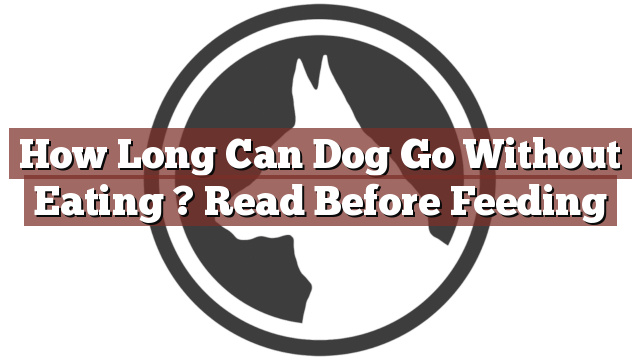Understanding Your Dog’s Dietary Needs
As a responsible pet owner, it is essential to understand your dog’s dietary needs to ensure their overall health and well-being. Dogs, like humans, require a balanced diet that provides them with the necessary nutrients, vitamins, and minerals. A well-rounded diet promotes proper growth, strengthens their immune system, and helps maintain a healthy weight.
A dog’s diet should consist of high-quality protein, healthy fats, carbohydrates, fiber, and a variety of fruits and vegetables. It is important to note that not all human food is safe for dogs to consume. Foods such as chocolate, grapes, onions, and garlic can be toxic to dogs and should be avoided at all costs.
How Long Can Dogs Go Without Eating? Read Before Feeding
Now, let’s address the question that many pet owners often wonder: how long can dogs go without eating? While dogs are known for their love of food, they have a remarkable ability to survive for several days without eating. However, it is crucial to understand that prolonged periods without food can have serious consequences on your dog’s health.
Can dogs go without eating for an extended period? Yes, they can. However, it is not advisable to let your dog go without eating for more than 24 to 48 hours. If your dog refuses to eat for an extended period, it may indicate an underlying health issue, and you should consult a veterinarian to determine the cause.
Pros and Cons of Feeding a Dog
Feeding your dog a regular, balanced diet has numerous benefits. It provides them with the essential nutrients they need for optimal health and energy levels. Some key advantages of feeding your dog properly include:
- Weight management: A well-proportioned diet helps maintain a healthy weight, preventing obesity and related health issues.
- Strong immune system: Proper nutrition boosts your dog’s immune system, making them less susceptible to infections and diseases.
- Improved digestion: A balanced diet promotes healthy digestion, reducing the likelihood of gastrointestinal problems.
However, it is essential to consider the potential downsides of overfeeding your dog. Overfeeding can lead to obesity, which can cause joint problems, diabetes, and other serious health issues. It is best to follow the feeding guidelines recommended by your veterinarian or consult with them to determine the appropriate portion sizes for your dog’s age, breed, and activity level.
In Conclusion: Providing Proper Nutrition for Your Beloved Canine
Ensuring that your dog receives proper nutrition is paramount to their overall health and longevity. While dogs can go without eating for a short period, it is important to monitor their eating habits closely. If your dog refuses to eat or shows signs of illness, it is crucial to seek veterinary attention promptly.
Remember, a balanced diet consisting of high-quality ingredients, appropriate portion sizes, and avoidance of harmful foods is key to supporting your dog’s well-being. By providing your beloved canine companion with the right nutrition, you can enjoy many happy and healthy years together.
Thank you for taking the time to read through our exploration of [page_title]. As every dog lover knows, our furry friends have unique dietary needs and responses, often varying from one canine to another. This is why it's paramount to approach any changes in their diet with caution and knowledge.
Before introducing any new treats or making alterations to your dog's diet based on our insights, it's crucial to consult with a veterinarian about [page_title]. Their expertise ensures that the choices you make are well-suited to your particular pet's health and well-being.
Even seemingly harmless foods can sometimes lead to allergic reactions or digestive issues, which is why monitoring your dog after introducing any new food item is essential.
The content provided here on [page_title] is crafted with care, thorough research, and a genuine love for dogs. Nevertheless, it serves as a general guideline and should not be considered a substitute for professional veterinary advice.
Always prioritize the expert insights of your veterinarian, and remember that the health and happiness of your furry companion come first.
May your journey with your pet continue to be filled with joy, love, and safe culinary adventures. Happy reading, and even happier snacking for your canine friend!

